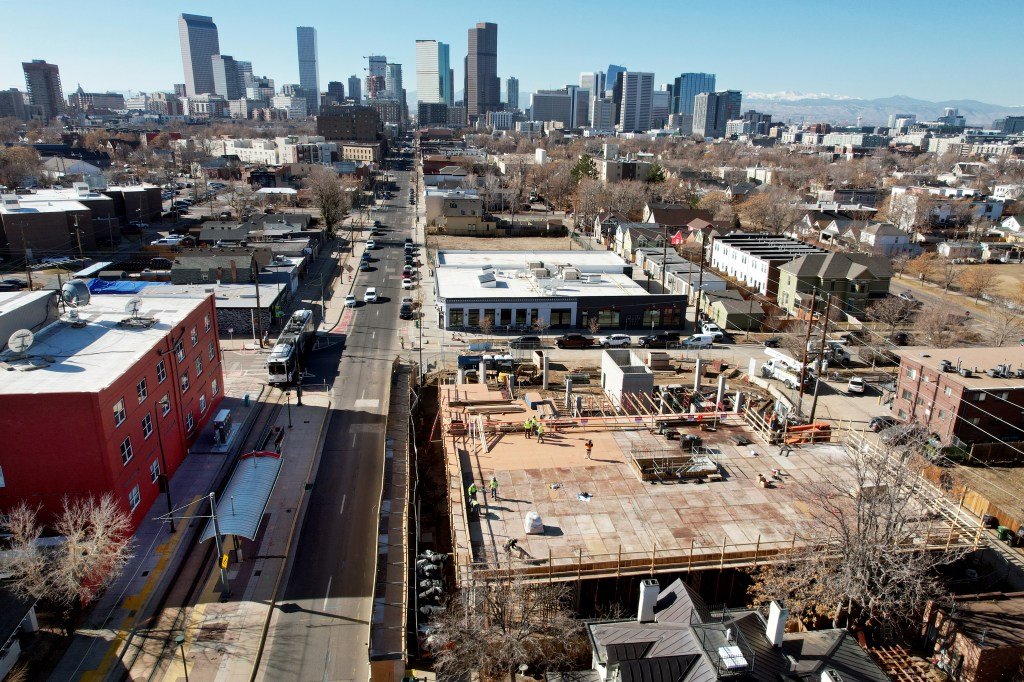Two blocks from the Regional Transportation District‘s 30th and Downing Street Station, Taco Uprising cooks are counting on new customers from 62 condos under construction on a former RTD lot, sold off in the agency’s push to convert surplus public transit parking for housing.
“If RTD can make it so there’s more affordable housing near public transit stations, it would help businesses. It would probably reduce traffic congestion. It would probably make people nicer and more trusting,” Taco Uprising manager Ben Hans said.
Last year, RTD directors accepted a discount price of $1.5 million, less than half the market value of $4.1 million, for the property, according to the developer who purchased it.
The plan there and at eight or so other sites around metro Denver is to create compact transit-oriented communities using Park-n-Ride lots and possibly other RTD property, giving developers access to the land at below market rates if necessary to encourage building.
But the income-restricted condos here in Five Points won’t be available for more than a year. Taco Uprising owners, who’d hoped the condos and a likely infusion of new customers would come sooner, have had to reduce their hours, fighting to survive, Hans said, noting other businesses on Welton Street have closed.
The influx of people Hans hoped for was delayed as the deal was negotiated and RTD agreed to the sale and the price — an indication the deals RTD seeks can take time.
For the past eight years, RTD has been exploring opportunities within a half-mile of stations. Meanwhile, RTD ridership has decreased, from 106 million passengers in 2019 to around 65 million.
“Where there are parking spaces that aren’t being used and that can be converted, from 100 parking spaces into several hundred affordable housing units going up vertically, that’s a benefit for RTD from a revenue and a ridership perspective,” said Chessy Brady, RTD’s manager of transit-oriented development. “It creates opportunities for folks to live by a transit station and have access to all their daily needs. It is a win-win,” Brady said.
State lawmakers in 2024 granted RTD the authority to sell, lease, or rent out “transit assets” at less than full market value. RTD directors have committed to leasing, rather than selling, to retain control over land and create a steady future revenue stream. (Brady said the sale finalized last year on Welton Street was unique because that parking lot wasn’t technically a transit asset.)
Last week, lawmakers introduced RTD legislation directing a modernization of the agency’s transit-oriented development policy to “enable the development of affordable housing and dense, walkable, mixed-use communities near transit stations and routes.” It would install an urban planner as a non-voting member on the RTD’s elected governing board and would require the RTD to help meet state housing goals.
“I want the RTD to be in alignment with us,” said Sen. Faith Winter, who chairs the Colorado Senate Transportation and Energy Committee and co-sponsored the bill. “Do we want to have more affordable housing? Yes. Do we want more transit? Yes. Do we want more ridership? Yes. Do we want to reduce air pollution? Yes. Do we want to increase safety? Yes.” RTD officials would have “the same authority that local governments have” to develop land, Winter said — “more freedom.”
Among the projects emerging is a deal for a massive affordable apartment complex on lots at RTD’s Central Park Station.
The Ulysses Development Group would remove about 650 Park-n-Ride spaces for the construction of up to 800 income-restricted apartments where residents in households earning less than 80% of the median income could live on rent adjusted to one-third of their monthly earnings.
RTD surveys found about 400 cars were parked in Central Park Station lots during weekday peak times in 2023 with more than 1,500 parking spaces available, RTD’s general manager and chief executive Debra Johnson said.
If 650 parking spots are removed, “there would be no impact to customers who currently park at Central Park Station” and “the total spaces would decrease to 850, leaving ample parking during peak times,” she said.
“Adding residents to Central Park Station also would activate plazas and public spaces as well as support nearby businesses, all contributing to a positive civic and transit environment.”
RTD officials and developers are exploring possibilities to convert Park-n-Ride lots for housing at Alameda Station, Colorado Station, the Olde Town Arvada Station, University Station, Sheridan Station, and Yale Station, Brady said. Other possibilities include lots along transit routes in Adams County, Englewood, Broomfield, Lakewood, and Littleton. Developers typically approach RTD to discuss deals before drawing up plans for presentation “to the jurisdiction that has zoning authority,” Brady said. “It is better for the jurisdiction to control their own zoning than for us to dictate zoning as the transit agency.”
The agency owns more than 30,000 Park-n-Ride spaces on 80 properties across its 2,342-square-mile service area spanning eight counties.
RTD wouldn’t say how many properties have been sold since 2017. JS filed a legal request under the Colorado Open Records Act to check this. RTD officials responded, saying it would cost $450 for 16 hours of staff time to provide that information.
Nationwide, the American Public Transportation Association has encouraged housing and commercial development concentrated around transit hubs.
“It has taken too long to get this going. There’s a natural synergy in having residential development at transit stops so that we can keep more people off the roads and on public transportation,” and combine that with commercial development, said former RTD executive director and board chairman Doug Tisdale, who launched agency efforts to take advantage of surplus property. He recently completed an eight-year stint on RTD’s elected board and serves as a director of APTA.
“We can create hubs that draw people. Our stations are logical points for intelligent development. We need to do what we can to incentivize that,” Tisdale said.
Taxpayers who paid for RTD’s initial acquisition of Park-n-Ride and other properties might expect sales for full market value, he said.
But RTD is acting to alleviate metro Denver’s affordable housing crisis and a land deal for that purpose is “something most people will sign off on because they do want to see opportunities for people to have a home, an apartment, hopefully a condo with ownership,” Tisdale said. “The majority of people will understand there’s a reasonable public policy.”
However, former RTD director Jon Caldara, president of the Independence Institute, a libertarian think tank, strongly opposes any RTD role in housing development, especially if that means selling or leasing public property at less than market value. Caldara accused RTD leaders of “ripping off taxpayers and ripping off riders” to be “housing developers” in a “social engineering” scheme to determine where low-income workers live.
The agency ought to focus on completing the FasTracks rail lines as promised and improving service, Caldara said. “Just do the job. RTD currently cannot run safe buses and trains. Ridership is down. Transit-dependent people who don’t have cars are getting lousy service.”
Why haven’t more affordable housing deals been finalized? One obstacle is that “developers are not happy doing development on property that is leased,” Tisdale said. And “developers have been concerned they’re not going to see deals approved in a timely fashion and that there might be too many strings attached.”
The re-development of Denver’s Union Station, done under a lease deal with RTD, grew into a $500 million project that spurred private investment of billions of dollars in residential housing and commercial development within a 15-minute walk. RTD receives revenues including a small percentage from coffee, beer, and sandwich sales at the station.
“Good developers will be enticed” by the availability of RTD’s properties for lease to construct affordable housing, Tisdale said.
In Five Points, the nonprofit Elevation Community Land Trust committed to developing the 62 condos a block from RTD’s 30th and Downing Station — a project named after actress and singer-songwriter Hattie McDaniel (a child of formerly enslaved parents who grew up in Colorado and became the first African American to win an Oscar) — to help apartment renters with low incomes become owners. The deal wasn’t finalized until last year, three years after discussions began in 2021. Denver Mayor Michael Johnston attended a groundbreaking ceremony in October.
A sign at the site says construction should be completed by March 2026. This housing project “provides RTD the opportunity to demonstrate its commitment to being part of the solution to the region’s affordable housing crisis,” agency general manager Johnson said.
RTD’s decision to sell the property, instead of insisting on a lease, and agreement to a sale price less than half the $4.1 million assessed value, made the project possible, ECLT chief executive Stefka Fanchi said. “It wouldn’t be feasible with a lease. It’s difficult to develop affordable housing” and “often the price of the land dictates the feasibility of a project,” Fanchi said.
RTD owns another property north of downtown at 38th Avenue and Blake Street valued at $47 million, Brady said. Developers would be hard-pressed to build affordable housing at sites with land costs so high, she said.
The leasing price hasn’t been settled in the deal with Ulysses Development Group for their proposed 800-unit affordable apartment complex on a Park-n-Ride lot by RTD’s Central Park Station at Smith Road and Ulster Street. Ulysses is working to line up financing, and “we’re still having that conversation” about the price, said Heather Lafferty, senior advisor at Ulysses. Ulysses will have to rely on state and federal funding to make a deal. If all goes well, construction could begin as soon as 2027, Lafferty said.
“For affordable housing, public resources often aren’t available. That’s been the biggest obstacle we have to overcome,” she said. “But RTD seems to have put their foot on the gas more. The need for affordable housing, alongside the recognition of opportunities to increase ridership, has contributed to recent increased momentum.”
Get more Colorado news by signing up for our Mile High Roundup email newsletter.













Leave a Reply